Related Research Articles

Rotoscoping is an animation technique that animators use to trace over motion picture footage, frame by frame, to produce realistic action. Originally, animators projected photographed live-action movie images onto a glass panel and traced over the image. This projection equipment is referred to as a rotoscope, developed by Polish-American animator Max Fleischer. This device was eventually replaced by computers, but the process is still called rotoscoping.

The Cinema of Iran, also known as the Cinema of Persia, refers to the cinema and film industries in Iran which produce a variety of commercial films annually. Iranian art films have garnered international fame and now enjoy a global following. Iranian films are usually written and spoken in the Persian language. Iranian cinema has had many ups and downs.

Ryan is a 2004 short animated documentary film created and directed by Chris Landreth about Canadian animator Ryan Larkin, who had lived on skid row in Montreal as a result of drug and alcohol abuse. Landreth's chance meeting with Larkin in 2000 inspired him to develop the film, which took 18 months to complete. It was co-produced by Copper Heart Entertainment and the National Film Board of Canada (NFB), and its creation and development is the subject of the NFB documentary Alter Egos. The film incorporated material from archive sources, particularly Larkin's works at the NFB.

A Scanner Darkly is a 2006 American adult animated psychological science-fiction film written and directed by Richard Linklater; it is based on the 1977 novel of the same name by Philip K. Dick. The film tells the story of identity and deception in a near-future dystopia constantly under intrusive high-tech police surveillance in the midst of a drug addiction epidemic. The film was shot digitally and then animated using interpolated rotoscope, an animation technique in which animators trace over the original footage frame by frame, for use in live-action and animated films, giving the finished result a distinctive animated look.

Leila Hatami is an Iranian actress. She is known for her work in Iranian cinema, including her performance in the Academy Award-winning film A Separation (2011), for which she won the Silver Bear Award for Best Actress at the Berlin Film Festival.
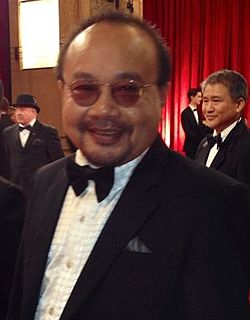
Rithy Panh is a Cambodian documentary film director and screenwriter.

Dariush Mehrju'i is an Iranian director, screenwriter, producer, film editor and a member of the Iranian Academy of the Arts.
The history of Iranian animation, which began in its modern form in the mid 20th century in Iran, can also be traced back to the Bronze Age.

Persepolis is a 2007 animated biographical drama film based upon Marjane Satrapi's autobiographical graphic novel of the same name. It was written and directed by Satrapi in collaboration with Vincent Paronnaud. The story follows a young girl as she comes of age against the backdrop of the Iranian Revolution. The title references the historical city of Persepolis. The film was an international co-production made by companies in France and Iran. It premiered at the 2007 Cannes Film Festival, where it co-won the Jury Prize, alongside Silent Light. In her acceptance speech, Satrapi said "Although this film is universal, I wish to dedicate the prize to all Iranians." It was released in France and Belgium on 27 June 2007, earning universal praise from critics, and was nominated for Best Animated Feature at the 80th Academy Awards.
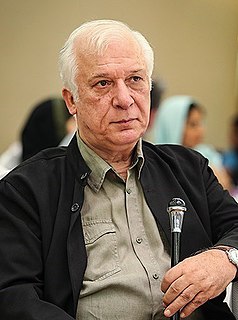
Khosrow Sinai was an Iranian film director, screenwriter, music composer, poet, and scholar.

Seyyed Shahab Hosseini is an Iranian actor, director and film producer. Hosseini is known for his collaborations with Iranian writer and director Asghar Farhadi in About Elly (2009), A Separation (2011), and The Salesman (2016).
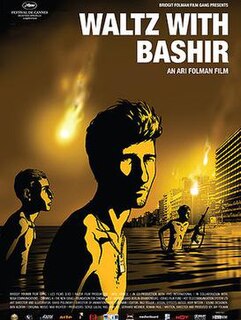
Waltz with Bashir is a 2008 Israeli adult animated war documentary drama film written, produced and directed by Ari Folman. It depicts Folman in search of his lost memories of his experience as a soldier in the 1982 Lebanon War.
Hisko Hulsing is a Dutch director, animator, composer, painter and storyboard artist.

The Salesman is a 2016 drama film written and directed by Asghar Farhadi and starring Taraneh Alidoosti and Shahab Hosseini. It is about a married couple who perform Arthur Miller's 1949 play Death of a Salesman on stage. When the wife is assaulted, her husband attempts to determine the identity of the attacker, while she struggles to cope with post-trauma stress. Farhadi chose Miller's play as his story within a story based on shared themes. A co-production between Iran and France, the film was shot in Tehran, beginning in 2015.
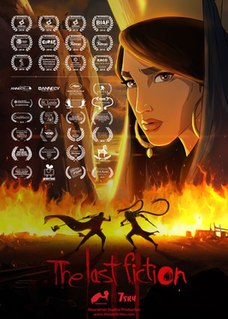
The Last Fiction is an animated film adaptation of the story of "Zahhak", a page from the historical identity of Iranians and one of the central tales of Shahnameh by Ferdowsi. Ashkan Rahgozar is the director of The Last Fiction. The main idea of the recounting of this tale is to lend a different perspective to the legends and heroes of ancient Iranians. Production started in 2010, and since then over 100 animators have worked on the film.
Ashkan Rahgozar is an author, director and film maker of Animation. He is founder and chief executive of Hoorakhsh Studios. He earned his BA degree in graphic design and MA degree in illustration.
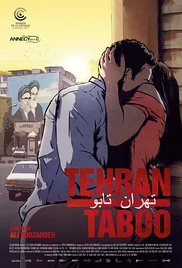
Tehran Taboo is a 2017 Persian-language German-Austrian animated romance film directed by Ali Soozandeh.

Ali Zare Ghanatnowi is an Iranian film director, screenwriter, translator, cinema teacher, graphic designer, cameraman, and film producer. An active film-maker from 2000, he had been involved in over twenty films, including animations, shorts, and documentaries. Zare attained critical acclaim for directing Empty View (2017) and Dad's Fragile Doll (2013) which was awarded the best animation of International Open Film Festival (IOFF). His other film Empty View has won multiple international awards, including the best animation of Asians On Film. The music part in Empty View is made by Mohammadreza Aligholi. Empty view has been in the official selections for the best animation in Edmonton International Film Festival in Canada. This festival is among those confirmed by Oscar Academy that is hold every year in Edmonton, Alberta. Ali Zare Ghanat Nowi who had achieved this before, by Dad's Fragile Doll being selected in Anima Mundi (event), now again reached this place by Empty View.
Sina Ataeian Dena is an Iranian film director, screenwriter and film producer.
References
- 1 2 "Ali Soozandeh". Semaine de la Critique du Festival de Cannes. Retrieved 18 February 2018.
- ↑ Kenigsberg, Ben (2018-02-13). "Review: 'Tehran Taboo' Exposes Double Standards About Sex in Iran". The New York Times. ISSN 0362-4331 . Retrieved 2018-02-19.
- 1 2 "Meet Your Maker – Ali Soozandeh – Animation is Film". Animation is Film. Archived from the original on 2018-02-19. Retrieved 2018-02-18.
- ↑ "Tehran Taboo Press Kit (pdf)". Celluloid-Dreams.com. Archived from the original on 21 February 2018. Retrieved 20 February 2018.
- 1 2 "Cannes: The Hidden World of Iran's Nightlife Revealed in Exclusive 'Tehran Taboo' Clip". The Hollywood Reporter. Retrieved 2018-02-19.
- ↑ "The Director of 'Tehran Taboo' Breaks Down His Powerful, Shocking Film". The Dot and Line. 2017-12-01. Retrieved 2018-02-18.
- 1 2 3 Rothe, E. Nina (2017-06-12). "Breaking the Rules in Iran: Ali Soozandeh Talks 'Tehran Taboo' in Cannes". Huffington Post. Retrieved 2018-02-18.
- ↑ "Tehran Taboo (2018)". Rotten Tomatoes. Retrieved 19 February 2018.
- ↑ "Tehran Taboo". Metacritic. Retrieved 19 February 2018.
- 1 2 3 "Ali Soozandeh • Director – Interview". Cineuropa – the best of European cinema. Retrieved 2018-02-19.
- ↑ Makin, Shira (2018-02-14). "The Iranian Film That Breaks the Taboo on Sexuality". Haaretz. Retrieved 2018-02-23.